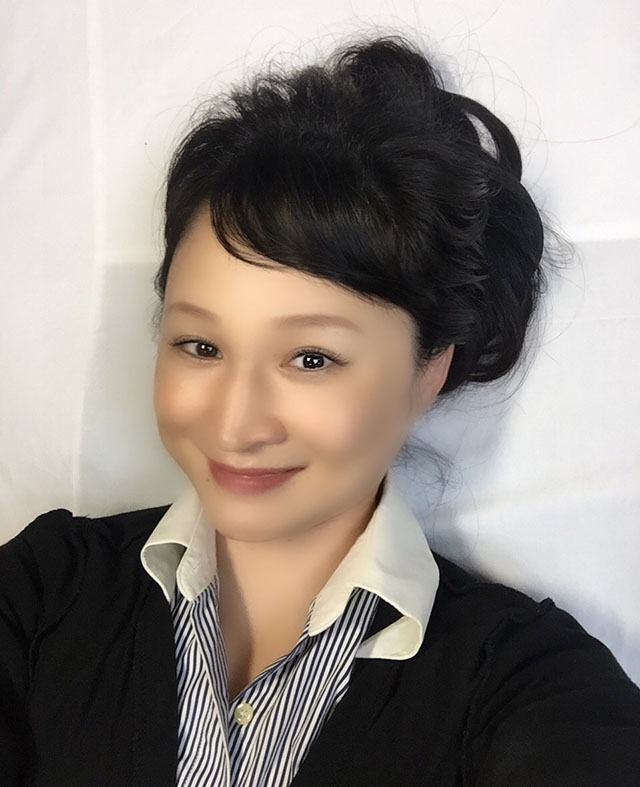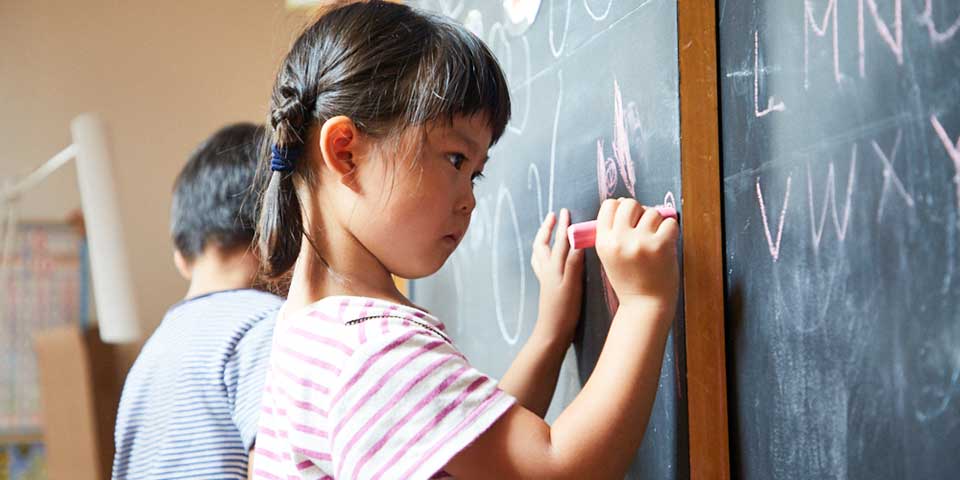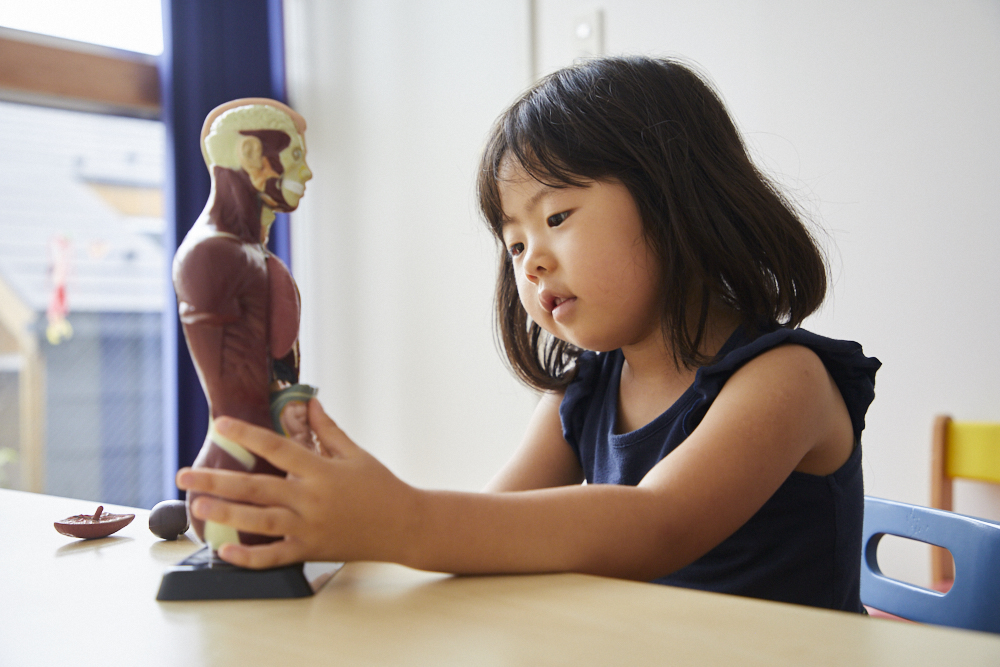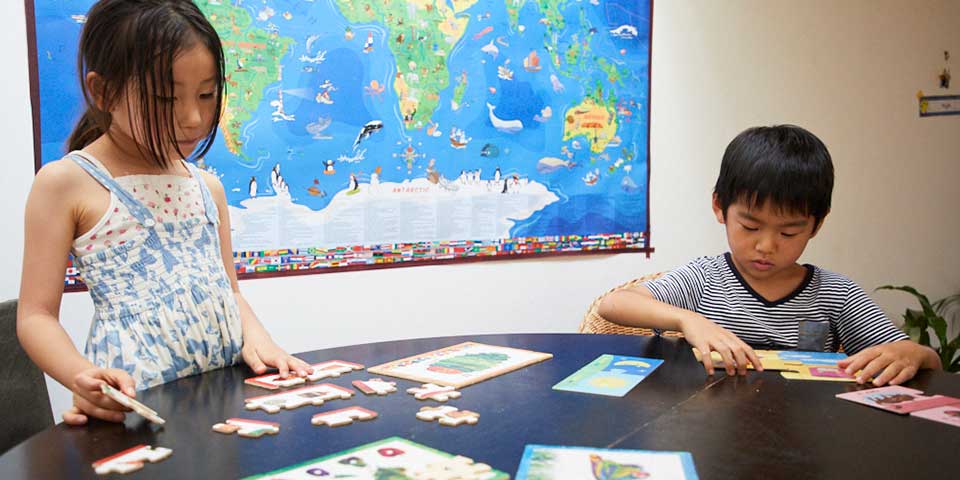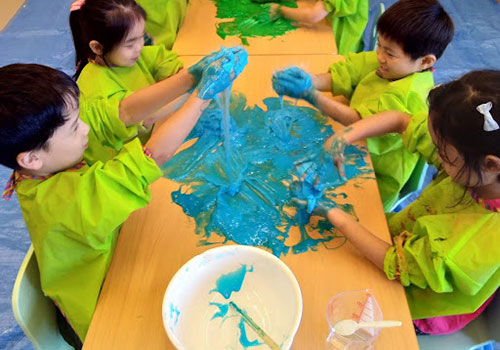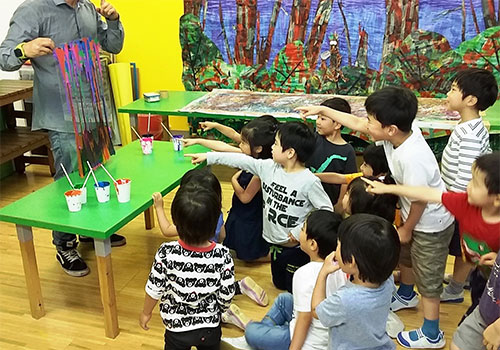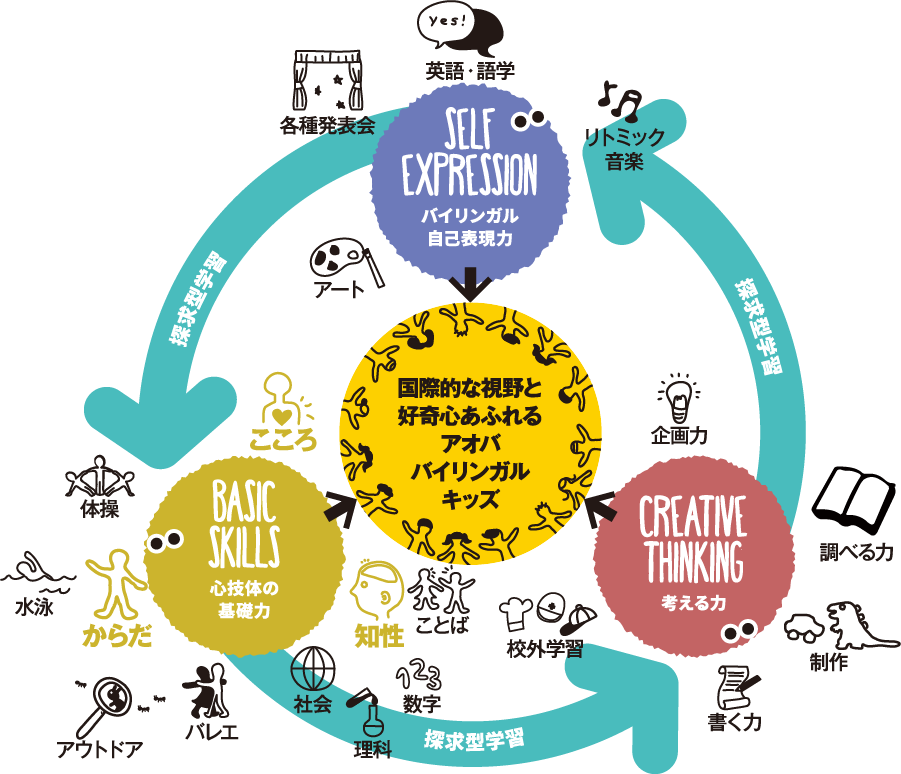
Overview
At AJBP Nakano, our programs are based on the three foundations:Core Skills, Creative Thinking, and Bilingual Self-Expression.
| Core Skills | Depending on the child’s development level, children get support in their emotional, cognitive, and motor skills. These basic skills lead to creative thinking and self-expression. |
|---|---|
| Creative Thinking | A few times a year, with a given theme, children are given the opportunity to do a research. This gives an idea of how to think on their own and make decisions for themselves. We think this is crucial for the kids born in the 21st century, a whole new era we cannot yet imagine. |
| Bilingual Self-Expression | Compared to the global world, Japanese education system still has a long way to go when it comes to presentation skills as well as self-expression skills. Our bilingual and multicultural environment nurture children to have such skills in both Japanese and English. |
There is no point in learning a language without the ability to think critically and to express those thoughts. These three foundation blocks are essential within a balanced methodology. For this reason, AJB adopts the International Baccalaureate’s inquiry-based learning model.
Inquiry-Based Learning and Holistic Education
“The goal of education is not the acquisition of knowledge; it is to nurture intelligence that can be demonstrated in diverse ways of thinking.”
– Alec Peterson (International Baccalaureate First Secretary-General)
A significant feature of the International Baccalaureate Programme is that it is made up of Inquiry-Based Learning and Holistic Education. The pleasure that children will discover through these will last for a life-time and will lead to more motivation to keep learning.
| Inquiry-Based Learning |
Inquiry-Based Learning emphasizes on developing children’s curiosity, creativity, and communication skills. Instead, language acquisition, numeracy, spatial awareness, and social skills are prioritized. With us, children are rarely taught in the traditional format where the teacher is in front of the classroom, only communicating through a whiteboard. Challenged with fun projects, children will be motivated and inquisitive to further learning. The methodology of inquiry-based learning through the International Baccalaureate Programme is a method that has been recognized by the Ministry of Education, Culture, Sports, Science and Technology. As a result, children graduating from Aoba-Japan Bilingual Preschool, Nakano, will be well-prepared to enroll in both Japanese and International elementary schools. For more details about inquiry-based learning, please see the Aoba-Japan Bilingual Preschool prospectus provided at briefing sessions. |
|---|---|
| Holistic Education |
Holistic education in the International Baccalaureate Programme emphasizes not only on the importance of acquiring skills and values, but also on a will to act. This is important in order for them to become the leaders that would contribute to the society. To become a responsible person in a community, IB programme enriches children’s life experiences through arts, activities, and sports.(Section 2.6 describes our special program which is designed from this aspect). In both English class and Japanese class, AJB children are taught to take good care of things around them. For instance, to be in harmony, to clean up after themselves, to be considerate of others, and to be patient. These are some of the things Japan values to being a responsible person in a community. |
Bilingual Education
Our goal is not to see the children get good grades on exams or to see the kids use big words. Our goal is to see our children communicate spontaneously and express themselves freely. To achieve this, children will learn English through activities evolving around the research theme set for them.
| One Day Immersion | For a language to become a part of them, it is important that a child is being immersed in the environment of that one language for a certain amount of time. The IB-PYP begins with 3 year olds. They spend the entire days immersed in one language. |
|---|---|
| Learning Environment | Language acquisition is influenced not solely by hearing, but also by visual cues. Children spend their English day in an “English Zone”, and their Japanese day in a “Japanese Zone, where what they see also reflects what they hear and speak. . |
| Phonics | For ESL students, we adopt synthetic phonics. This helps them to improve their pronunciation, reading, and writing abilities. 4 year old children begin reading and writing activities in the second half of the year. |
| Mother Tongue | The most important language is a child’s first language, which supports the ability to think. That is why we are committed to strengthen Japanese as well. We do not rush children into writing and reading in either language until they are four years old. It is not until a child begins to communicate their ideas and thoughts clearly in their first language, that they can begin to express themselves in a second. |
Nature and Science
Learning in a classroom environment will not necessarily fulfill everything children need in their development. It is just as important to go out and actually experience interacting/communicating with the outside world through activities such as science experiments.
| Nature |
Needless to say the significance of being in a natural environment, nature teaches a lot to children through their five senses. The changes and the beauty in nature affect their instincts as well as their inspirations, stabilizing their minds and greatly helping to develop their mind and body. In central Europe, there are increasing numbers of forest kindergartens where children spend all day in a forest. Besides the educational advantages provided by this kind of environment, after finishing kindergarten, these children demonstrate enhanced agility, sense of balance, and even immunity. At Aoba-Japan Bilingual Preschool, Nakano, besides the daily outdoor playtime, once a month, children have ‘Forest Day’ where they experience nature for half a day in a large park such as Wadabori-Park or Yoyogi-Park. |
|---|---|
| Science |
Learning about natural sciences is a critical part of children’s educational needs. Throughout the curriculum, we value the time for scientific discovery and exploration: for example, What is magnetism? What happens when paint colors are mixed? Our curriculum contributes to children’s’ development of observational skills. To do so, they examine animals and plants not only on books, but in natural environments during their outdoor play time. In addition, through programming, we have a curriculum that helps children’s cognitive ability.. By using a three dimensional objects/toys, they will deepen their understanding of shapes and spatial awareness as well as numbers and logical thinking. |
Outdoor Activities – Developing Mind and Body
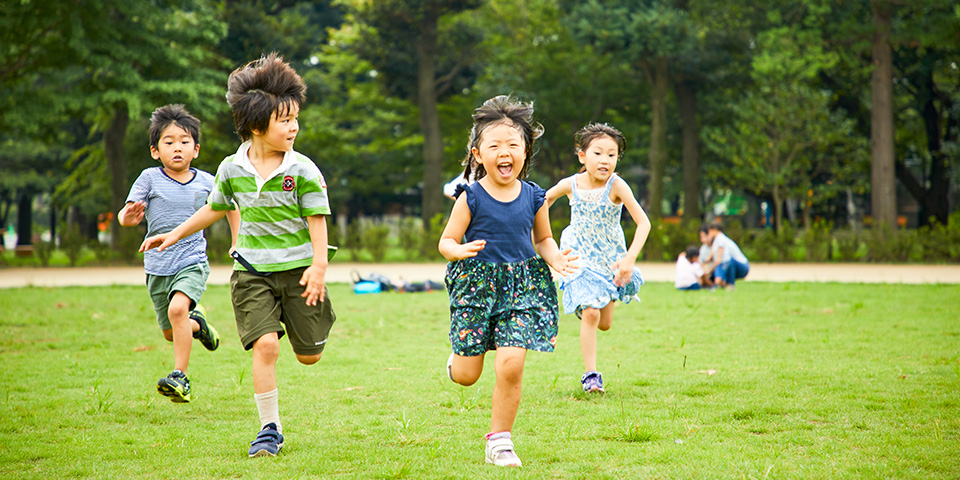
At Aoba-Japan Bilingual Preschool, Nakano, 2 year olds are taken to 3 neighborhood parks. (a 5 minute walk from campus.) We also have a courtyard on campus. As for 3 to 5 year olds, they get to go to Minamidai Ichou Park where they can let loose, run around, and play. (10minitue ride on our school bus) If the weather permits, they can play outside everyday.
Through various exercises and games at the newly built Hiromachi Mirai Park, children learn the rules and pleasures of exercising. This leads to the creation of healthy bodies, athletic skills, and intellectual abilities. We believe that this is fundamentally important for developing minds and bodies during early childhood.
In addition, the following activities are introduced through our special afternoon programs: physical education, dance, and eurhythmics. These activities provide greater emphasis on the development of physical abilities and also strengthen them in long term. In early childhood this is particularly crucial.
Special Programs
Every child discovers the world differently. To optimize each child’s opportunity to learn, we provide a rich and diverse environment full of discoveries and challenges. The notion around Holistic education is that in order to have a rich life, it is best for children to be familiar with physical activity as well as the arts. This is why music and exercise are two significant parts of our program
The programs that follow are included in the core program. All of them are taught by professional teachers, instructors, and coaches. Since they are a part of the regular curriculum, even those families who don’t have time to take their children for extracurricular studies, can be rest assured that their children have these experiences during regular school days.
| Specialist Program | Target | Coach | Notes |
|---|---|---|---|
| Music Eurhythmics | 2-5 years | Music Eurhythmics Coach | Early childhood is a critical period for acquiring senses of pitch and rhythm. |
| Gymnastics | 2-5 years | Director- Harumi Nakahashi | These sessions include running, jumping, mat exercises, balance beams, jump ropes, ball games, and more. These are exercise skills which improve confidence and physical fitness. |
| Dance | 3-5 years | Dance Coach | Through different dance techniques we improve rhythmic sense, reflexes, and physical expression. |
※ There may be changes made to these content.
Physical Education Director (Gymnastics) Harumi Nakahashi – Biography
Ms. Nakahashi won the All Japan Women’s Gymnastics Championship (1996) and the silver medalist in the World Student Championship (1994). She was the training partner for Tani Ryoko (2004 Athens Olympics, Gold Medal) and the training partner for Kaori Matsumoto (2012 London Olympics, Gold Medal and 2016 Rio Olympics Bronze Medal). After working under the supervision of a business association she became the Aoba-Japan Bilingual Preschool Physical Education Director.
In addition, AJB offers an optional after school program from 2:30p.m. on weekdays, where children can learn ballet, dance and soccer. We believe that by offering these activities within the campus,children won’t be stressed out by traveling from one place to another for extracurricular activities. This program opens doors for children from busy families to still be able to children expand their potentials. .
